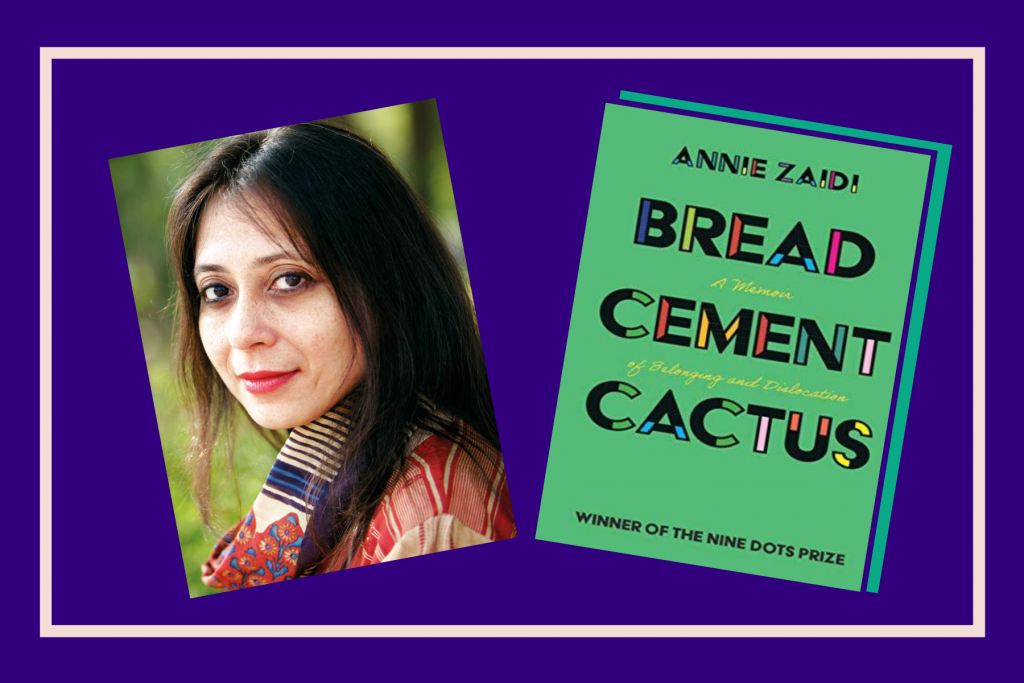
Nine Dot Prize winner Annie Zaidi describes the concepts of acceptance and displacement in her new book “Bread, Cement, and Cactus.” Before I read the words between the title, “A memoir of belonging and dislocation,” I thought about my personal experiences as a second-generation woman in America. Do I truly understand the topic of belonging?
The history of my people, Indo-Caribbeans, has been an ongoing tale of dislocation. The notion of being accepted in a place, culture or situation seems surreal at times. So when the opportunity came to learn more about the concept of belonging, I dived headfirst into the words of Annie Zaidi’s memoir. Though I may not connect on the displacement Annie Zaidi felt in India, her reasoning and detailed analysis mirrored the differences between our worlds. Zaidi took the word “home” and related personal accounts to politics in order to understand her identity, the role of women in the home, Indian societies, and the political division with regards to burials and graves.
View this post on Instagram
As a woman, we ask ourselves what does “home” mean? Annie Zaidi highlights that most women accept that their home is not a place of safety or a place where they could be themselves. Women are often taught to be prepared to leave their homes after marriage. Men, on the other hand, are not taught that same mindset. This feeling of a home gives some men the power of entitlement. Throughout the book and Zaidi’s journey of defining home, she elaborates more on entitlement and division. Family demands of dowry have led to violence with little to no justice. This further divides women away from their rights, and statistics reveal it is evident that many do not see women as equal but merely as a prize.
Society would have to change. It hasn’t changed. In 2017, offences registered under the Dowry Prohibition Act numbered 10,189; dowry deaths numbered 7,466. These are just the ones reported. Most families do not report until there actual violence or if wives are thrown out, or threatened, or until women’s fathers meet their demands.
This injustice has led people to fear having a daughter, which leads to female infanticide or neglecting proper nutrition when the daughter is born. Feminine dislocation has been a prevalent issue for years as “men continue to think of themselves as masters of woman’s bodies” this can be seen as “evidenced by a global trail of blood.” Zaidi shines a light on the horror of what an androcentric society is, yet reiterates the concept of dislocation not only to emphasize the pain women go through but the healing and belonging they could find when following their own path.
[Read Related: Book Review: Grief and Loss in ‘Wave’ by Sonali Deraniyagala]
The divide is seen through many aspects including land, cultures, religion and political affiliations. The most jarring perspective Zaidi writes to define home is that of grave politics. Grave politics are the decisive actions made by a group of individuals in regard to a ceremony connected with the final disposition of a dead body. This is something that not many people correlate with the concept of home, yet Zaidi paints the unspoken truth of belonging even when deceased. Zaidi then compares the Sanskrit and Arabic teachings, God of which we came from, so we shall return. For many, the feeling of home could be the concept of the afterlife, such as heaven, a place of safety and paradise with God.
However, the displacement of this concept is seen through the lens of social privileges and economic status, where those who can afford a proper burial ceremony treat the lower castes inhumanely. In regard to burials and cremations, the family of the lower caste must worry about the upper caste region. Some lower caste family members dump bodies out into the river because they do not have access to upper caste land for proper burial or cremation ceremonies. This heartbreaking truth is more than enough to realize that the concept of belonging is not the same for everyone as some see themselves as more powerful.
[Read Related: Colonization, Displacement and the Indo-Caribbean Identity: A Poem]
I highly recommend this thought-provoking read for its gripping words, informative facts and clear author journey. Zaidi describes the meaning of home by saying
Questions of where you are from are therefore most often about who you are. I am defined by genetic heritage, and by cultural, political, and personal values, which in turn are shaped by my access to ideas outside of my geographic location. The more I read and travel, the more my location of ‘self’ changes.
From understanding the growth of one’s self the reader will come to see that,
Rivers and hills too may disappear within my own lifetime. But like a train of thought, like a film of moving images, something of home remains within.
The notion of dislocation and belonging is captured from the perspective of the reader. Though history, politics, and social means may define us, the definition of home is one we create.
Follow Annie Zaidi on Twitter! You can buy “Bread, Cement, and Cactus” through many resellers including Barnes and Noble.




